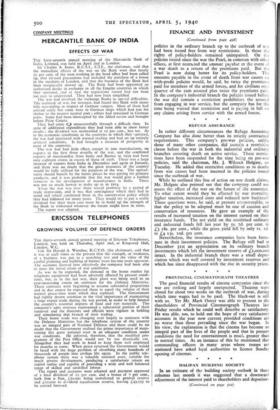MERCANTILE BANK OF INDIA
EFFECTS OF WAR
THE forty-seventh annual meeting of the Mercantile Bank of India, Limited, was held on April and in London.
Sir Charles A. limes, K.C.S.I., C.I.E., the chairman, said that the immediate effects of the war on the Bank were that nearly so per cent. of the men working in the head office had been called up, that air-raid precautions had included the purchase of a house in the outskirts of London, and that the business of the Bank had been temporarily slowed up. The Bank had been appointed an authorised dealer in exchange in all the Empire countries in which they operated, and at first the regulations issued had not been too easy to understand. They had now been simplified. The war had involved the exchange Banks in spezial difficulties. The outbreak of war, for instance, had found this Bank with many bills oustanding in respect of German cargoes. Most of them had arrived safely but some were in German ships which had run for shelter to the nearest neutral port ; others had remained in German ports. Some had been intercepted by the Allied navies and brought before Prize Courts.
They had come is unsuccessfully through a difficult time. In spite of additional expenditure they had been able to show better results ; the dividend was maintained at 12 per cent., less tax. As to the economic conditions in the countries in which they operated, the war had interfered with normal trading and had set up entirely artificial conditions. It had brought a measure of prosperity to most of the countries.
The war had had little effect, except in jute manufactures, on exports in the first three months of the war, and the combined exports of merchandise from India and Burma in 1939 nad been only eighteen crores in excess of those of 1938. There was a large increase of exports from India in December and again in January, and there was no doubt that the great resources of the country would be fully utilised for the purposes of the war. The agricul- turist should benefit by the better prices he was getting for primary products, and it was probable that the war would give a further stimulus to the development of manufactures in India. There was not so much leeway to make up as in 1914.
When the war was over there would probably he a period of trade depression, and it was that contingency which they had in mind and which confirmed them in the conservative policy which they had followed for many years. They would try to pay a stable dividend but their main care must be to build up the strength of the Bank to withstand whatever the future might have in store.
The report was adopted.














































 Previous page
Previous page